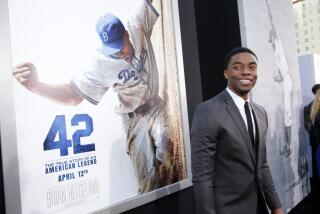It takes a rugby player’s daring
- Share via
The raucous and bold documentary “Murderball” looks at the sport of quad rugby, played on a basketball court on which players in wheelchairs maneuver, sometimes violently, to move a ball upcourt and across the goal line. Though the players are quadriplegics, meaning they have some form of restricted mobility in all four limbs, the sport is fiercely and passionately played, and at the international level, the stakes are high with gold medals, national and individual pride on the line.
Directors Henry Alex Rubin and Dana Adam Shapiro focus on a group of men -- primarily the U.S. national team, plus a former player who went on to coach Canada -- who demonstrate the courage and physical strength required to play the game. In going beyond sports and looking into these men’s lives, Rubin and Shapiro have crafted the best of this year’s sports films -- fiction or documentary.
The film is framed by the intense rivalry between the Canadian and American teams stretching between the 2002 World Championships in Sweden and the 2004 Paralympics in Athens. The Canadians challenge the dominant USA team behind firebrand coach Joe Soares. Soares had been a star for the U.S. for many years and was in his 40s when he was cut in 2000 from the national team. Bitter, Soares headed north to lead Canada, sparking resentment among some of his former teammates.
A Portuguese immigrant who contracted polio as a child, Soares resembles Robert Duvall as a vein pulsates on his forehead while he screams orders at his players and trades barbs with the Americans. He rolls up and down the sideline barely restraining himself from joining the on-court fray. Rubin and Shapiro discover a goldmine in Soares’ heart-rending relationship with his 12-year-old, Robert, a saga that embodies the quintessential dysfunction that seemingly passes from every father to son.
The U.S. player on whom Soares grates the most is Mark Zupan, a fierce younger competitor who lost his mobility in a truck accident when he was in college. Zupan channels his anger into the game and is an articulate and entertaining spokesman. One of the many compelling subplots involves his evolving relationship with his estranged best friend, Chris Igoe, who was at the wheel the night Zupan was injured.
A third story line introduces Keith Cavill, a young man paralyzed in a motocross accident. Through Cavill’s progress in months of rehab we get a glimpse of some of what the quad rugby players must have gone through. It is through Cavill we see the monumental challenge that opening an envelope or putting on shoes initially presents.
An inspiring story not only of how these men overcame challenges to become great athletes (or in some cases regain their athleticism) but also of how they deal with mundane everyday chores such as buying groceries or washing dishes, “Murderball” is a thoughtful and provocative look at a previously little-seen world. In allowing the players to speak openly about subjects they are passionate about, they craft deeper and more honest profiles. With topics including how people treat them in public, how they pick up women in bars, and how they learned that their disabilities did not necessarily preclude sex, the documentary humanizes a group of people who are often marginalized by a society that doesn’t see past the wheelchair.
*
‘Murderball’
MPAA rating: R for language and sexual content
Times guidelines: Sports violence, some rowdy behavior and sexual how-to
A ThinkFilm release. Directors Henry Alex Rubin, Dana Adam Shapiro. Producers Jeffrey Mandel, Shapiro. Executive producers Randy Manis, Jeff Sackman, Mark Urman, Micah Green. Based on the article by Shapiro. Cinematographer Rubin. Editor Geoffrey Richman. Music Jamie Saft. Running time: 1 hour, 26 minutes.
In selected theaters.
More to Read
Only good movies
Get the Indie Focus newsletter, Mark Olsen's weekly guide to the world of cinema.
You may occasionally receive promotional content from the Los Angeles Times.











